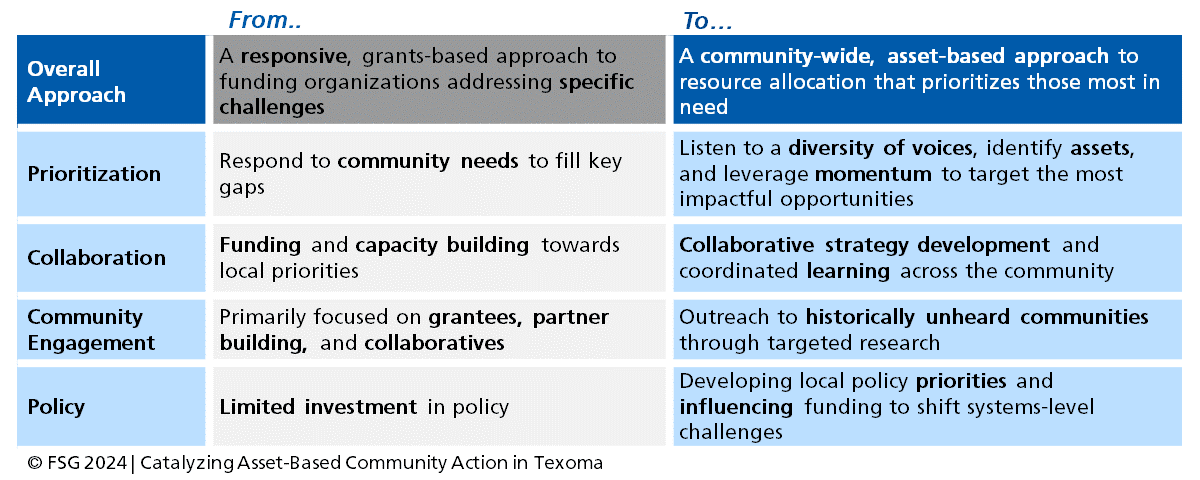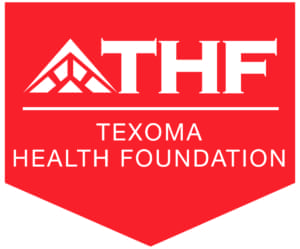Texoma Health Foundation (THF) is a nonprofit community public health foundation. Serving as the region’s largest health funder since 2007, THF was formed with a mission to improve the health and well-being of residents in a four-county service area of the Texoma region in northern Texas and southern Oklahoma.
The Texoma region spans rural and semi-urban communities on both sides of the Red River between Oklahoma and Texas. About an hour north from the Dallas-Fort Worth metro area and 2 hours south of Tulsa, rapid development from the neighboring cities is diversifying the region’s landscape, economy, and population. The region is also home to the sovereign nations of the Choctaw and Chickasaw peoples.
Throughout its history, the foundation has had a long-standing commitment to mental well-being demonstrated in efforts such as leading an “Okay to Say” campaign to encourage people to share their mental health struggles, facilitating the establishment of county-level Behavioral Health Leadership Teams, and investing in a community park to increase access to outdoor space. In 2022, THF received a $6 million unrestricted grant from MacKenzie Scott, providing an opportunity for the foundation to transform how it supports the community. With the compounding factors of rising housing prices and limited infrastructure, generational poverty, and a culture of self-reliance, mental well-being of community members has been on the rise, especially for marginalized groups. At the most acute level, death by suicide has increased over 38% in Texoma over the past 20 years. Consequently, THF saw an opportunity to meaningfully mobilize their community assets in a sustainable, long-term plan to improve community mental well-being.
FSG supported THF to engage in a community-centered strategic planning process. With FSG, THF utilized an asset-based approach, reimagining their role beyond grantmaking to serving as a community-wide advocate for mental well-being. This strategic planning process strengthened THF’s roles of regional convener, advocate, and capacity builder by facilitating cross-sector collaboration, deepening and building relationships, and raising the voices of those who had been traditionally less heard by the foundation and the community.

The Process
 Identifying Assets and Challenges
Identifying Assets and Challenges
To build a community-led strategy, it is important to have an asset-based understanding of your community. This involves knowing who your partners are, your own strengths as a foundation, and what you have the capacity and expertise to do.
The FSG team started the process by conducting interviews with THF board and staff, who shared a desire to more deeply understand the diverse needs and assets of their community, knowing that their service area is large, but interventions need to be tailored. FSG turned to community leaders, including school leaders, law enforcement officers, mental health providers, faith leaders, and a variety of social service providers, who agreed that the close-knit nature and deep care that individuals and organizations have for their communities in Texoma is unique. However, they noted that the individual efforts of leaders in communities were not significant enough to solve the deep and complex challenges in their region.
Additionally, FSG held focus groups with an emphasis on populations and communities with the most disparate mental well-being outcomes to better understand their unique experiences. For instance, a focus group with Choctaw and Chickasaw Nation members emphasized striking mental health disparities experienced due to marginalization and disinvestment. Residents who had direct experience with mental well-being challenges, either personally or as family members or caregivers, underscored the challenges of stigma and the shame encircling mental health in their communities.
 Identifying Solutions Together
Identifying Solutions Together
Building momentum with organizations doing good work and collaborating across strategies to fill cross-cutting gaps in the community is vital. This requires examining existing assets and challenges that cannot be resolved by one organization alone.
After establishing an understanding of community assets and needs, FSG and THF brought community members together in “Community Solutions Sessions” to align on the greatest opportunities for impact and inform how THF could best support them. Sessions were organized in partnership with board members and local leadership, such as county-level Behavioral Health Leadership Teams, to gain wide participation from community members closest to the challenges. The three sessions that took place across the four counties drew in over 100 community members. Not only did this process leverage existing community assets, but it also fostered a shared sense of ownership of the challenges and created opportunities for increased collaboration to address them. Through this process, THF was also able to build relationships in the Oklahoma counties, which had been historically challenging.
The Impact
Place-based foundations are uniquely positioned to identify and address problems that span multiple systems and actors, which no singular organization can solve. Many of these foundations have the distinctive vantage point to act as connectors, conveners, and advocates. They can develop a sense of shared ownership of systems that ultimately have no leader. They can also serve as an advocate for challenges that exist across multiple organizations. Playing these roles can lift the burden of the system off individual actors and harness the power of the community to collectively solve them. Ultimately, this creates more space for individual organizations to do what they do best: provide resources to their communities. THF leaned into this opportunity through community-led research and community solutions sessions. Most importantly, they adopted a strategy that reflected community-led solutions and harnessed their unique position for the greatest impact.
Based on our shared learnings, FSG recommended that THF use their position to assume two key roles that best served the community through (1) an advocacy and leadership role at the regional level, where cross-sectoral efforts focused on improving mental well-being had not previously existed and (2) a capacity-building role to support coordinated, cross-sectoral efforts at the county level. These two roles leverage the position of the foundation in a way that best served the community, allowing THF to address significant gaps in the region, while also being responsive to the many ideas, hopes, and concerns that the community holds.
 Advocacy and Leadership at the Regional Level
Advocacy and Leadership at the Regional Level
The community-centered strategic planning process led by FSG revealed that while there are numerous community efforts to improve mental well-being, they are often isolated and resource-constrained. This underscored the need to increase regional awareness and resources to address this widespread challenge. As a regional leader on mental well-being, THF is well-positioned to fill this gap. As THF leans into its role as the primary regional advocate and leads strategies that address cross-cutting needs in Texoma, they are engaging in activities such as:
- Coordinating a region wide vision for mental well-being, an agenda addressing the key needs in the region, and shared goals and metrics (i.e., a regional dashboard)
- Leading key efforts that address cross-cutting regional needs (e.g., increasing provider capacity)
- Collaborating with other funders and mental well-being leaders to bring new resources, ideas, and programs to the region
- Partnering with broader regional, state, and federal organizations to align on and advocate for needed policy changes
 Supporting Cross-Sectoral Efforts at the County Level
Supporting Cross-Sectoral Efforts at the County Level
The shift to an asset-based strategy led to a focus on co-developing tailored solutions in individual communities led by local leaders. In each county, THF is working to support collaboratives of cross-sector leaders to design and implement strategies that address the systemic barriers to mental well-being. The shift emphasized the importance of coordinated infrastructure across the diverse region. THF is catalyzing momentum and expanding capacity to increase access to care and support for mental well-being through collaboratives and trusted leaders by:
- “Table setting” and tactical support for cross-sector mental well-being collaboratives in Fannin and Grayson counties, and a new collaborative spanning Bryan and Marshall counties
- Offering guidance and guardrails for each collaborative to facilitate consistency in their conversations, processes, and strategies
- Investing in strategies identified by each collaborative that address pressing local needs related to mental well-being
- Partnering to support implementation of regional strategies (e.g., awareness campaigns)
- Funding to respond to essential needs (e.g., food, housing, childcare) that are key to supporting mental well-being
The THF story is a testament to how a foundation can shift from a problem-solving approach to building an asset-based strategy with the community. This shift resulted in new approaches for greater impact:
- Channeling resources into more targeted, high-impact strategic initiatives to address the most pressing challenges raised by communities
- Targeting implementation approaches that reach populations with the greatest disparities
- Community-wide data collection to build the case for increased investment in and raise awareness for mental well-being
- Supporting the development of local advocacy efforts to influence funding and shift systems
Through centering community assets, building power with existing structures rather than creating new ones, and taking an evidence-informed, community centered-approach, THF was able to create a strategy that harnessed the assets of the community and builds the infrastructure for deep, sustainable change.
We challenged FSG to create a plan that is “bigger” than our foundation—a community-owned, community-led plan that is evidence-based—and maintain an assets lens in a rural community full of momentum, talent, and strengths. It was also important to us to have the FSG team help us engage those in community who are often unheard voices in community. They delivered on every challenge we gave them, and it is by far the strongest strategic plan I have ever had the opportunity to be a part of.” – Michelle Lemming, President and CEO, Texoma Health Foundation
If you are a place-based foundation wondering how to take your strategy from being community-informed to community led, you can reach out to us about our strategic planning services here.
About Texoma Health Foundation
Texoma Health Foundation is a nonprofit community public health foundation. THF was formed in 2007 with a mission to improve the health and well-being of residents in its four-county service area in North Texas and Southern Oklahoma. The Foundation operates direct programs, family endowments and awards grants to area nonprofits with a priority on mental health, access to healthcare services and nursing.



 Identifying Assets and Challenges
Identifying Assets and Challenges Identifying Solutions Together
Identifying Solutions Together  Advocacy and Leadership at the Regional Level
Advocacy and Leadership at the Regional Level  Supporting Cross-Sectoral Efforts at the County Level
Supporting Cross-Sectoral Efforts at the County Level

